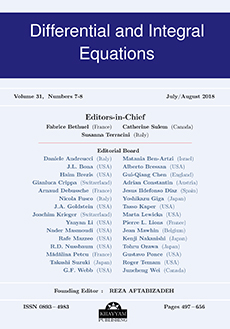Abstract
In this paper we analyze the monotonicity of the time to peak response $T_{\rm max}$ with respect to the drug dose $D$ for the four different turnover models I - IV, as introduced by Dayneka et al. [2]. We do this for the situation when the drug is supplied through an initial bolus, and eliminated according to a single exponential function and stimulation or inhibition takes place through a Hill function. We show that in Models I and III, in which the drug impacts the production term, the function $T_{\rm max}(D)$ is increasing for all values of the system- and the drug parameters. For Model II (inhibition of the loss term) the situation is more delicate. Here we prove monotonicity of $T_{\rm max}(D)$ for a substantial range of values of the rate- and drug constants, but leave the question of monotonicity open for some values. Finally, in Model IV (stimulation of the loss term) the function $T_{\rm max}(D)$ is known not to be monotone for some values of the rate constants and $I_{\rm max}$ [12].
Citation
Hoai-Minh Nguyen. Lambertus A. Peletier. "Monotonicity of time to peak response with respect to drug dose for turnover models." Differential Integral Equations 22 (1/2) 1 - 26, January/February 2009. https://doi.org/10.57262/die/1356038551
Information





